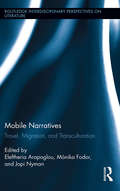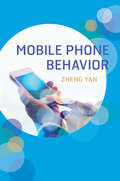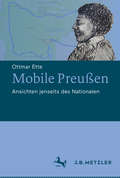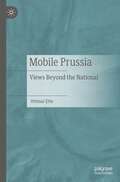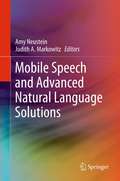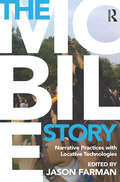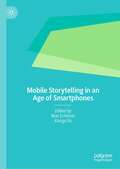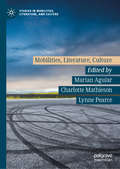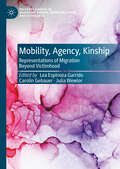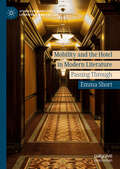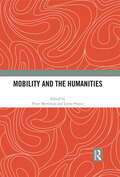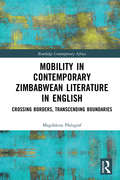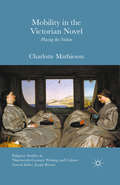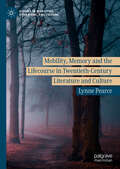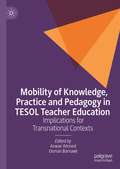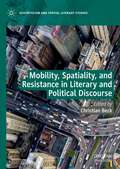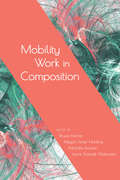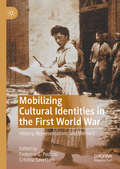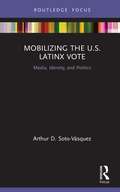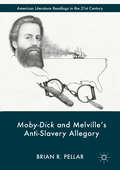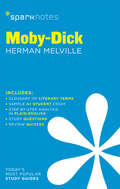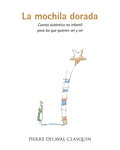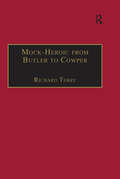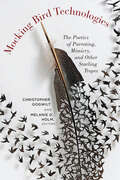- Table View
- List View
Mobile Narratives: Travel, Migration, and Transculturation (Routledge Interdisciplinary Perspectives on Literature #18)
by Eleftheria Arapoglou Mónika Fodor Jopi NymanEmphasizing the role of travel and migration in the performance and transformation of identity, this volume addresses representations of travel, mobility, and migration in 19th–21st-century travel writing, literature, and media texts. In so doing, the book analyses the role of the various cultural, ethnic, gender, and national encounters pertinent to narratives of travel and migration in transforming and problematizing the identities of both the travelers and "travelees" enacting in the borderzones between cultures. While the individual essays by scholars from a wide range of countries deal with a variety of case studies from various historical, spatial, and cultural locations, they share a strong central interest in the ways in which the narratives of travel contribute to the imagining of ethnic encounters and how they have acted as sites of transformation and transculturation from the early nineteenth century to the present day. In addition to discussing textual representations of travel and migration, the volume also addresses the ways in which cultural texts themselves travel and are reconstructed in various cultural settings. The analyses are particularly attentive to the issues of globalization and migration, which provide a general frame for interpretation. What distinguishes the volume from existing books is its concern with travel and migration as ways of forging transcultural identities that are able to subvert existing categorizations and binary models of identity formation. In so doing, it pays particular attention to the performance of identity in various spaces of cultural encounter, ranging from North America to the East of Europe, putting particular emphasis on the representation of intercultural and ethnic encounters.
Mobile Phone Behavior
by Zheng YanThis book provides the first comprehensive introduction to the newly-emerging science of mobile phone behavior. It presents the unexpected complexity of human mobile phone behavior through four basic aspects of mobile phone usage (users, technologies, activities, and effects), and then explores four major domains of such behavior (medicine, business, education, and everyday life). Chapters open with thoughts on mobile phone usage and behavior from interviews with cell phone users, then present a series of scientific studies, synthesized knowledge, and real-life cases, concluding with complex but highly readable analyses of each aspect of mobile phone behavior. Readers should achieve two intellectual goals: gaining a usable knowledge of the complexity of mobile phone behaviour, and developing the skills to analyze the complexity of mobile phone usage - and further technological behaviors.
Mobile Preußen: Ansichten jenseits des Nationalen
by Ottmar EttePreußen als Nationalstaat, als Kulturstaat, als Militärmacht: Jenseits dieser eindimensionalen Vorstellungen entfaltet das neue Buch von Ottmar Ette das Bild eines vielperspektivischen Preußen. Von Anton Wilhelm Amo, der sich als erster schwarzer Philosoph an einer preußischen Universität immatrikuliert, über die Projektion des preußischen Gemeinwesens durch Friedrich den Großen auf Neuspanien und die Herrschaft Moctezumas bis hin zu dem holländischen Philosophen Cornelius de Pauw, der seine Werke in Berlin in französischer Sprache verlegt und die weltweit geführte Berliner Debatte um die Neue Welt befeuert, vom jüdischen Salon der Rahel Varnhagen über Heinrich von Kleists Imagination der Haitianischen Revolution bis hin zu Adelbert von Chamisso und Alexander von Humboldt, der nicht als »wahrer« Preuße galt: Es werden verschüttete Traditionen einer Geschichte lebendig, die aus dem gängigen Bild Preußens ausgebürgert wurden. Ette erzählt von mobilen Preußen, deren Beziehungen sich zu einem Mobile Preußens anordnen.
Mobile Prussia: Views Beyond the National
by Ottmar EttePrussia as a nation-state, as a cultural state, as a military power: beyond these one-dimensional ideas, Ottmar Ette's new book unfolds the picture of a multi-perspective Prussia. From Anton Wilhelm Amo, the first black philosopher to matriculate at a Prussian university, to Frederick the Great's projection of the Prussian polity onto New Spain and the reign of Moctezuma, to the Dutch philosopher Cornelius de Pauw, who published his works in French in Berlin and fueled the worldwide Berlin debate about the New World, from the Jewish salon of Rahel Varnhagen to Heinrich von Kleist's imagination of the Haitian Revolution to Adelbert von Chamisso and Alexander von Humboldt, who was not considered a "true" Prussian: Buried traditions of a history that have been expatriated from the common image of Prussia come to life. Ottmar Ette tells of mobile Prussians whose relationships arrange themselves into Prussia as a mobile.This book is a translation of the original German 1st edition Mobile Preußen by Ottmar Ette, published by J.B. Metzler, imprint of Springer-Verlag GmbH Germany, part of Springer Nature in 2019. The translation was done with the help of artificial intelligence (machine translation by the service DeepL.com). The author (with the friendly support of Patricia Gwozdz) has subsequently revised the text further in an endeavour to refine the work stylistically.
Mobile Speech and Advanced Natural Language Solutions
by Judith A. Markowitz Amy Neustein"Mobile Speech and Advanced Natural Language Solutions" presents the discussion of the most recent advances in intelligent human-computer interaction, including fascinating new study findings on talk-in-interaction, which is the province of conversation analysis, a subfield in sociology/sociolinguistics, a new and emerging area in natural language understanding. Editors Amy Neustein and Judith A. Markowitz have recruited a talented group of contributors to introduce the next generation natural language technologies for practical speech processing applications that serve the consumer's need for well-functioning natural language-driven personal assistants and other mobile devices, while also addressing business' need for better functioning IVR-driven call centers that yield a more satisfying experience for the caller. This anthology is aimed at two distinct audiences: one consisting of speech engineers and system developers; the other comprised of linguists and cognitive scientists. The text builds on the experience and knowledge of each of these audiences by exposing them to the work of the other.
The Mobile Story: Narrative Practices with Locative Technologies
by Jason FarmanWhat happens when stories meet mobile media? In this cutting-edge collection, contributors explore digital storytelling in ways that look beyond the desktop to consider how stories can be told through mobile, locative, and pervasive technologies. This book offers dynamic insights about the new nature of narrative in the age of mobile media, studying digital stories that are site-specific, context-aware, and involve the reader in fascinating ways. Addressing important topics for scholars, students, and designers alike, this collection investigates the crucial questions for this emerging area of storytelling and electronic literature. Topics covered include the histories of site-specific narratives, issues in design and practice, space and mapping, mobile games, narrative interfaces, and the interplay between memory, history, and community.
Mobile Storytelling in an Age of Smartphones
by Max Schleser Xiaoge XuThis book explores contemporary approaches to mobile storytelling, with contributions covering mobile education, news and screen storytelling, creative practice research, and the impact on vulnerable communities and social innovation. With 18 original chapters, Schleser and Xu bring together international media and communication scholars, digital storytellers, filmmakers, musicians, and educators to discuss the significant contributions made by mobile storytelling within academia, culture and society, resulting in a vibrant and interdisciplinary collection that will be a valuable resource to researchers across the arts, humanities and social sciences. This edited collection is a result of the collaboration between Mobile Studies International (MSI) and the Mobile Innovation Network & Association (MINA) at the International Mobile Storytelling Congress (IMSC) at the University of Nottingham Ningbo China.
Mobilities, Literature, Culture (Studies in Mobilities, Literature, and Culture)
by Marian Aguiar Charlotte Mathieson Lynne PearceThis is the first book dedicated to literary and cultural scholars’ engagement with mobilities scholarship. As such, the volume both advances new theoretical approaches to the study of culture and furthers the recent “humanities turn” in mobilities studies. The book’s scholarship is deeply informed by cultural geography’s vision of a mobilised reconceptualisation of space and place, but also by the contribution of literary scholars in articulating questions of travel, technologies of transport, (post)colonialism and migration through a close engagement with textual materials. A comprehensive introduction maps pre-histories and emerging directions of this exciting interdisciplinary endeavor while taking up the theoretical and methodological challenges of the burgeoning subfield. Contributions range across geographical and disciplinary boundaries to address questions of embodied subjectivities, mobility and the nation, geopolitics of migration, and mobilities futures.
Mobility, Agency, Kinship: Representations of Migration Beyond Victimhood (Palgrave Studies in Mediating Kinship, Representation, and Difference)
by Lea Espinoza Garrido Carolin Gebauer Julia WewiorThis volume offers new perspectives on the ways in which migrants use storytelling practices and kinship formations in order to navigate and modify spaces of sovereignty, and thus to re-write narratives portraying them as helpless and passive victims. It provides one of the first investigations that assembles multidisciplinary contributions to look beyond individual acts of migrant agency and toward the entanglements of individual and collective agency, formations of kinship structures, and feelings, expressions, and representations of community and (multiple) belonging(s). The contributions explore the interplay between agency, kinship, and migration from various fields, including sociology, psychology, philosophy, border studies, gender and queer studies, postcolonial studies, ecocriticism, film and media studies, and literary and cultural studies – with a special focus on interdisciplinary narrative theory. They address real and imagined assertions of migrant agency and kinship formations; draw on empirical research, interviews, and accounts of lived experiences; and analyze the role of narrative, media, and technologies in artistic, literary, and cinematic representations of migrant agency and kinship. By probing migrant identity discourses in different cultural and medial contexts, the contributions examine how narratives negotiate and challenge the unequal distribution of mobility, resources, and vulnerability that preconfigures many migrant lives; they also discuss narrative devices, storytelling techniques, and other representational strategies that migrants employ, as well as technologies that they draw on, to lay powerful claims on space and citizenship and to eschew established scripts of victimhood. As such, the volume addresses and embraces the tensions between vulnerability and agency that come to the fore when we try to understand the different ways in which migrants shape, and are shaped by, their (trans)local, material, economic, affective, social, cultural, and political realities.
Mobility and the Hotel in Modern Literature: Passing Through (Studies in Mobilities, Literature, and Culture)
by Emma ShortThis book considers the complex ways in which the hotel functions to express the shifting experiences of modernity in the works of such authors as Anthony Trollope, Wilkie Collins, Arnold Bennett, H.G. Wells, and Elizabeth Bowen. The text contributes to the critical debates on nineteenth- and twentieth-century literature concerning space, movement, and mobility, arguing that the hotel reconfigures boundaries of modernist, middlebrow, and popular fiction. Drawing on a range of interdisciplinary theoretical and analytical perspectives, the book provides a critical and cultural history of the hotel in British literature, charting its changing nature and usage from the mid-nineteenth century up until the interwar period.
Mobility and the Humanities
by Peter Merriman Lynne PearceOver the past twenty years there has been something of a ‘mobilities turn’ across many disciplines in the social sciences. This book charts the increasing influence this turn is having on scholars in the arts and humanities, tracing the importance of questions and feelings of movement to scholars and arts practitioners across fields such as literary studies, historical geography, history, poetry and film. The book outlines what a mobilities turn might look like in the arts and humanities, tracing a genealogy of humanities engagements with themes of movement and mobility, and examining the different methods and textual sources humanities scholars have deployed. The book is uniquely positioned to speak to two audiences: mobilities scholars in the social sciences interested in learning more about how literary and cultural texts may be incorporated into their research, and researchers in the humanities who have only recently discovered that their thematic, or conceptual interest, in movement and mobility speaks directly to theories and philosophies that have circulated in the social sciences. This diverse and stimulating collection demonstrates the potential for future intellectual dialogues and creative collaborations around the theme of mobility. This book was originally published as a special issue of the Mobilities journal.
Mobility in Contemporary Zimbabwean Literature in English: Crossing Borders, Transcending Boundaries (Routledge Contemporary Africa)
by Magdalena PfalzgrafThis monograph explores the concept of mobility in Zimbabwean works of fiction published in English between the introduction of the controversial Fast Track Land Reform Programme and the end of the Mugabe era.Since 2000, Zimbabwe has experienced unprecedented levels of transnational out-migration in response to the political conflicts and economic downturn often referred to as the Zimbabwe Crisis. This, in turn, has led to an increased outpouring of literary texts about migration, both in locally produced texts and in works by authors based in the diaspora. Situating Zimbabwe’s recent literary developments in a wider context of Southern African writing and history, this book focuses on texts that portray movement within Zimbabwe’s cities, between village and city, to South Africa, and overseas. The author examines important developments and trends in recent Zimbabwean literature, investigating the link between state authoritarianism and control of mobility, and literature’s potential to intervene into dominant political discourses. The book includes in-depth analyses of ten recent works of fiction published in the post-2000 era and develops mobility as a key category of literary analysis of Zimbabwe’s contemporary literatures. Setting out a rich dialogue between literary criticism and mobility studies, this book will be of interest to researchers of African literature, Southern Africa, migration, and mobility.
Mobility in the Victorian Novel: Placing the Nation (Palgrave Studies in Nineteenth-Century Writing and Culture)
by Charlotte MathiesonMobility in the Victorian Novel explores mobility in Victorian novels by authors including Charles Dickens, Charlotte Brontë, Elizabeth Gaskell, George Eliot and Mary Elizabeth Braddon. With focus on representations of bodies on the move, it reveals how journeys create the place of the nation within a changing global landscape.
Mobility, Memory and the Lifecourse in Twentieth-Century Literature and Culture (Studies in Mobilities, Literature, and Culture)
by Lynne PearceThis book explores the formative role of mobilities in the production of our close relationships, proposing that the tracks—both literal and figurative— we lay down in the process play a crucial role in generating and sustaining intimacy. Working with diaries, journals and literary texts from the mid- to late-twentieth century, the book pursues this thesis through three phases of the lifecourse: courtship (broadly defined), the middle years of long-term relationships and bereavement. Building upon the author’s recent research on automobility, the text’s case studies reveal the crucial role played by many different types of transport—including walking—in defining our most enduring relationships. Conceptually, the book draws upon the writings of the philosopher, Henri Bergson, the anthropologist, Tim Ingold and the geographer, David Seamon, engaging with topical debates in cultural and emotional geography (especially work on landscape, memory and mourning), mobilities studies and critical love studies.
Mobility of Knowledge, Practice and Pedagogy in TESOL Teacher Education: Implications for Transnational Contexts
by Anwar Ahmed Osman BarnawiThis edited book brings together chapters from diverse geographical and educational contexts to examine the question of transnationalism in English Language teacher education. While the activities that connect people, institutions and cultural practices across the borders of nation-states have gained interest in fields such as applied linguistics, TESOL and migration studies in recent years, there has been little research so far into how transnationalism intersects with language teacher education, and how existing practices can be better integrated into teacher education programmes. The authors fill this gap by introducing and examining existing transnational practices - including cross-cultural settings, study abroad programmes and online teacher education - then offering multiple dialogues on mobility of knowledge, practice and pedagogy in teacher education. This book will be of interest to language teachers, teacher educators, and students and scholars of applied linguistics, cross-cultural studies, and migration studies.
Mobility, Spatiality, and Resistance in Literary and Political Discourse (Geocriticism and Spatial Literary Studies)
by Christian BeckMobility, Space, and Resistance: Transformative Spatiality in Literary and Political Discourse draws from various disciplines—such as geography, sociology, political science, gender studies, and poststructuralist thought—to posit the productive capabilities of literature in political action and at the same time show how literary art can resist the imposition and domination of oppressive systems of our spatial lives. The various approaches, topics, and types of literature discussed in this volume display a concern for social issues that can be addressed in and through literature. The essays address social injustice, oppression, discrimination, and their spatial representations. While offering interpretations of literature, this collection seeks to show how literary spaces contribute to understanding, changing, or challenging physical spaces of our lived world.
Mobility Work in Composition
by Bruce HornerMobility Work in Composition explores work in composition from the framework of a mobilities paradigm that takes mobility to be the norm rather than the exception to a norm of stasis and stability. Both established and up-and-coming scholars bring a diversity of geographic, institutional, and research-based perspectives to the volume, which includes in-depth investigations of specific forms of mobility work in composition, as well as responses to and reflections on those explorations. Eight chapters present specific cases or issues of this work and twelve shorter response chapters follow, identifying key points of intersection and conflict in the arguments and posing new questions and directions to pursue. Addressing matters of knowledge transfer and meaning translation, immigrant literacy practices, design pedagogy, academic career changes, student websites, research methodologies, school literacy programs, and archives, Mobility Work in Composition asks what mobility in composition means and how, why, and for whom it might work. It will be of broad interest to students and scholars in rhetoric and composition. Contributors: Anis Bawarshi, Elizabeth Chamberlain, Patrick Danner, Christiane Donahue, Keri Epps, Eli Goldblatt, Rachel Gramer, Timothy Johnson, Jamila Kareem, Carmen Kynard, Rebecca Lorimer Leonard, Andrea Olinger, John Scenters-Zapico, Khirsten L. Scott, Mary P. Sheridan, Jody Shipka, Ann Shivers-McNair, Scott Wible, Rick Wysocki
Mobilizing Cultural Identities in the First World War: History, Representations and Memory
by Federica G. Pedriali Cristina SavettieriThis book tackles cultural mobilization in the First World War as a plural process of identity formation and de-formation. It explores eight different settings in which individuals, communities and conceptual paradigms were mobilized. Taking an interdisciplinary approach, it interrogates one of the most challenging facets of the history of the Great War, one that keeps raising key questions on the way cultures respond to times of crisis. Mobilization during the First World War was a major process of material and imaginative engagement unfolding on a military, economic, political and cultural level, and existing identities were dramatically challenged and questioned by the whirl of discourses and representations involved.
Mobilizing the U.S. Latinx Vote: Media, Identity, and Politics (Routledge Focus on Digital Media and Culture)
by Arthur D. Soto-VásquezThis book examines the politics involved in the mobilization of the Latinx vote in America. Delving into the questions of race and identity formation in conjunction with the role of communication media, the author discusses the implications for Latinx voters and their place in the American political and racial system. Utilizing an in-depth study of the mobilizing efforts of national Latinx groups, along with a rigorous analysis of online media, news media, and electoral results, this book discusses: How the old notions of white and black America clash with the growing focus on Latinos How political organizers develop and use messages of racial solidarity to motivate people, what technologies are at their disposal, and what their use means How the study of new media is vital to exploring race in the 21st century, and why communication cannot ignore the racial legacies of the 20th century Theoretically located in between the fields of communication and racial/ethnic studies, this book will be of great relevance to scholars and students working in the field of communication studies, political communication, Latinx studies, and sociology.
Moby-Dick and Melville’s Anti-Slavery Allegory
by Brian R. Pellar J. Hillis MillerThis book unfurls and examines the anti-slavery allegory at the subtextual core of Herman Melville’s famed novel, Moby-Dick. Brian Pellar points to symbols and allusions in the novel such as the albinism of the famed whale, the “Ship of State” motif, Calhoun’s “cords,” the equator, Jonah, Narcissus, St. Paul, and Thomas Hobbe’s Leviathan. The work contextualizes these devices within a historical discussion of the Compromise of 1850 and subsequently strengthened Fugitive Slave Laws. Drawing on a rich variety of sources such as unpublished papers, letters, reviews, and family memorabilia, the chapters discuss the significance of these laws within Melville’s own life. After clarifying the hidden allegory interconnecting black slaves and black whales, this book carefully sheds the layers of a hidden meaning that will be too convincing to ignore for future readings: Moby-Dick is ultimately a novel that is intimately connected with questions of race, slavery, and the state.
Moby-Dick SparkNotes Literature Guide (SparkNotes Literature Guide Series #45)
by SparkNotesMoby-Dick SparkNotes Literature Guide by Herman Melville Making the reading experience fun! When a paper is due, and dreaded exams loom, here's the lit-crit help students need to succeed! SparkNotes Literature Guides make studying smarter, better, and faster. They provide chapter-by-chapter analysis; explanations of key themes, motifs, and symbols; a review quiz; and essay topics. Lively and accessible, SparkNotes is perfect for late-night studying and paper writing. Includes:An A+ Essay—an actual literary essay written about the Spark-ed book—to show students how a paper should be written.16 pages devoted to writing a literary essay including: a glossary of literary termsStep-by-step tutoring on how to write a literary essayA feature on how not to plagiarize
La mochila dorada: Cuento auténtico no infantil para los que quieren ver y oir
by Pierre Delaval-CasquinCon la presencia de una médium, recibió un mensaje de seres de luz diciéndole: "Es hora de escribir de tu propia cosecha". Y esa fue la razón de este libro, redactado al final del 2011, donde cuenta que todos llevamos una mochila cargada de todas nuestras acciones y pensamientos de esta vida, pero también sin saberlo, cargada de muchas vidas pasadas. <P><P>En este libro el autor nos dice que después de reconocernos por lo que somos en esencia, seres de luz y amor, tenemos el poder de decidir si vaciar esa mochila tan pesada para que se transforme en una mochila dorada que será como un rayo de luz cálido que alumbrará siempre tu camino. Este libro indica el proceso de esa transformación.
Mock-Heroic from Butler to Cowper: An English Genre and Discourse (Studies in Early Modern English Literature)
by Richard TerryMock-heroic is the exemplary genre of the English Augustan era: it is one of the few genres that the Augustans invented themselves, and it stands in a symbolic relation to a culture still reverential of the grandeurs of the classical past and uneasy about its ability to emulate them. Mock-Heroic from Butler to Cowper shows the protean nature of mock-epic at this time. It recounts the rise of mock-heroic, discusses the properties of the form, and explores its relation both to classical epic and to contemporary genres such as the poetic travesty and the novel. It also tracks the relation of mock-heroic to the concept to the sublime, especially to the low sublime unwittingly perfected by Richard Blackmore. Terry goes beyond previous commentators in arguing that mock-heroic was not merely a conventional genre, but also provided a supple discourse through which writers could represent a range of personal and social issues. He identifies mock-heroic properties in the Mandevillian discourse of economics and in the rhetoric of male gallantry towards women, in which women were simultaneously elevated and put down. He also sees mock-heroic as informing the idea of divine grace in the poetry and letters of William Cowper. Mixing a historical approach with incisive close readings, Terry provides a powerful re-evaluation of the form.
Mock Modernism
by Leonard DiepeveenHow was the modernist movement understood by the general public when it was first emerging? This question can be addressed by looking at how modernist literature and art were interpreted by journalists in daily newspapers, mainstream magazines like Punch and Vanity Fair, and literary magazines. In the earliest decades of the movement - before modernist artists were considered important, and before modernism's meaning was clearly understood - many of these interpretations took the form of parodies.Mock Modernism is an anthology of these amusing pieces, the overwhelming majority of which have not been in print since the first decades of the twentieth century. They include Max Beerbohm's send-up of Henry James; J.C. Squire's account of how a poet, writing deliberately incomprehensible poetry as a hoax, became the poet laureate of the British Bolshevist Revolution; and the Chicago Record-Herald's account of some art students' "trial" of Henri Matisse for "crimes against anatomy." An introduction and headnotes by Leonard Diepeveen highlight the usefulness of these pieces for comprehending media and public perceptions of a form of art that would later develop an almost unassailable power.
Mocking Bird Technologies: The Poetics of Parroting, Mimicry, and Other Starling Tropes
by Christopher GoGwilt and Melanie D. HolmContributors: Madeleine Brainerd, Joe Conway, Fraser Easton, Christopher GoGwilt, Shari Goldberg, Melanie D. Holm, Sarah Kay, Kaori T. Kitao, Holt V. Meyer, Isabel A. Moore, Fawzia Mustafa, Gavin Sourgen.Mocking Bird Technologies brings together a range of perspectives to offer an extended meditation on bird mimicry in literature: the way birds mimic humans, the way humans mimic birds, and the way mimicry of any kind involves technologies that extend across as well as beyond languages and species. The essays examine the historical, poetic, and semiotic problem of mimesis exemplified both by the imitative behavior of parrots, starlings, and other mocking birds, and by the poetic trope of such birds in a range of literary and philological traditions. Drawing from a cross-section of traditional periods and fields in literary studies (18th-century studies, romantic studies, early American studies, 20th-century studies, and postcolonial studies), the collection offers new models for combining comparative and global studies of literature and culture.EditorsChristopher GoGwilt is Professor of English and Comparative Literature at Fordham University. He is the author of The Passage of Literature: Genealogies of Modernism in Conrad, Rhys, and Pramoedya (Oxford, 2011), The Fiction of Geopolitics: Afterimages of Culture from Wilkie Collins to Alfred Hitchcock (Stanford, 2000), and The Invention of the West: Joseph Conrad and the Double-Mapping of Europe and Empire (Stanford, 1995).Melanie D. Holm is Assistant Professor of the English Department and Graduate Program of Literature and Criticism at Indiana University of Pennsylvania. She also teaches in the university’s Women’s and Gender Studies program. Her scholarly focus is on eighteenth-century literature and skepticism.ContributorsMadeleine Brainerd taught at Washington University in St. Louis and at Excelsior College. Since 2004 she has taught therapeutic yoga and medical qi gong in New York City, at the Integral Yoga Institute, Kenshikai Dojo, Gouverneur Hospital, and other venues. She studies histories of yoga’s intersections with ecological in/justice, animality, and affect theory.Joe Conway is an Assistant Professor of American Literature at the University of Alabama in Huntsville. His articles have appeared or are scheduled to appear in the journals Women’s Studies, Early American Literature, and Nineteenth-Century Contexts. He is currently at work on a monograph about the social life of antebellum money that charts how discourses of noneconomic phenomena such as medicine, race, nationalism, and aesthetics informed nineteenth-century debates about what constitutes good money.Fraser Easton is Associate Professor of English, University of Waterloo, Canada. A specialist in eighteenth-century literature, he has published on Jane Austen, Daniel Defoe, Maria Edgeworth, and Christopher Smart, as well as on newspaper records and historical accounts of passing women in the eighteenth century.Shari Goldberg is Assistant Professor of English at Franklin & Marshall College in Lancaster, Pennsylvania. She is the author of Quiet Testimony: A Theory of Witnessing from Nineteenth-Century American Literature (Fordham, 2013). She has also published essays on silence, politics, and personhood in American literature. Her current research focuses on late-nineteenth-century models of mind and person in narrative and psychological writing.Sarah Kay teaches French and Medieval Studies at New York University. She has written widely on medieval literature across languages, genres, and periods; her work combines the study of medieval texts, especially troubadour songs, with philosophical and theoretical inquiry. Her two most recent books are Parrots and Nightingales: Troubadour Quotations and the Development of European Poetry (2013) and Animal Skins and the Reading Self in Medieval Latin and French Bestiaries (2017).<b
